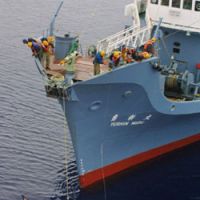Many environmentalists around the world hope that the whaling issue in Japan will simply fade with the now moribund industry. In Japan, though, the political prowhaling lobby has never been stronger.
Japan's domestic campaign is backed by the 98-strong Parliamentary Whaling League (PWL), whose members include Prime Minister Shinzo Abe, LDP high-flier Yoshimasa Hayashi (both from the whaling district of Shimonoseki in Yamaguchi Prefecture), Foreign Minister Taro Aso and Yokohama Mayor Hiroshi Nakata.
All the major political parties back whaling -- even the Communists -- and the Diet boasts just one antiwhaling lawmaker, Okinawa's Shokichi Kina. Supporting the antiwhaling cause in Japan would be as politically popular domestically as cheering on whaling boats in the Houses of Parliament in London.
Much as Japan's politicians champion logic and science in the service of their cause, however, it is clear that nationalism is one of the pillars that props up the campaign. Many of the most active prowhalers are on the right of the political spectrum, and the vast majority of the PWL has no electoral or commercial ties to whaling. In fact, only around 10 percent come from districts with a direct connection to the whaling industry.
Discussions in Japan about the loss of whaling are inevitably tinged with loss of national pride.
This from Hamada: "We're talking about managed whaling, so why are we being told we can't take any; that hunting whales is wrong? We were told to stop eating whalemeat because of pressure from abroad, and that it is barbarous. They eat dogs in South Korea and monkeys in China, and they call that barbarous too. We should start by accepting the other side's culinary culture and avoid telling them what to do."
Such is the consistency of these conversations that it is possible to construct a single, generic narrative -- one that goes like so:
"We have been hunting and eating whales since the Jomon Period [8000-300 B.C]. After World War II, we were starved of protein and were encouraged by the U.S. occupiers to hunt whales again. They then forced Japan to stop and criticized its eating customs as 'barbaric.' Now they ignore science, flout logic and embrace emotionalism in the face of our reasonable requests to return to sustainable whaling."
This whaling narrative even intersects with one of Japan's key historical nexuses: the Meiji Restoration of 1868, when, under threat from the West, the country began the transformation from a closed, feudal society to a modern, trading nation.
Prowhalers seldom fail to point out that the agent of this change, Cmdr. Matthew Perry, whose heavily armed "Black Ships" are credited with opening Japanese ports to trade, was on a mission in large part for the U.S. whaling industry, which needed safe ports and coaling stations for its crews and vessels hunting the whale-rich northwest Pacific and Sea of Japan.
"The credit for opening Japan went to the United States, and the common belief is that the U.S. was a kind of benefactor to Japan -- but I don't support [that idea or] that Japan's development as a modern nation came from an acceptance of U.S. demands," said Mayor Nakata recently.
"What America wanted to do basically was to facilitate its whaling operations . . . It was in its national interests to protect and secure its supply base. History should be taught with a correct knowledge of the facts."
For nationalists, the whaling controversy and the loss of the industry are forever linked with the hypocrisy of the West and the perceived humiliation of having to enter the modern world under pressure from U.S. gunboats. This original sin has since been compounded by Japan's forced withdrawal from the industry in the 1980s.
It is surely no accident, then, that prowhaling sentiment grew in Japan as its economic and political crisis worsened in the 1990s.
Despite the fact that the whaling issue was, in the words of former FA senior official and leader of the IWC Japanese delegation, Masayuki Komatsu, "dead in the water" in the late 1980s, and that the government was rumored to be about to "euthanize" the industry, it has since been brought juddering back to life by Japan's growing soft nationalism.
Hamada, for example, is quite explicit about why he sees the whaling campaign as so important:
"I think it is the only issue that shows Japanese diplomacy can achieve something when it sticks to its guns. Usually for Japan in relation to China and other countries, all the diplomatic cards tend to be held by our opponents. The whale negotiations are the only area where Japan can proactively take the initiative. We can show that Japanese diplomacy is effective in whale-hunting negotiations."
Put in this context, the sheer political energy expended on the prowhaling campaign begins to make some sense: Japan can demonstrate its diplomatic clout and show it is not completely deferential in the foreign-political arena, particularly to the U.S. In other words, whaling allows Japan to safely let off steam in the international arena -- without any significant political risk.
But that ignores the enormous cost to Japanese taxpayers.
See related stories:
Siege mentality fuels 'sustainability' claims





















With your current subscription plan you can comment on stories. However, before writing your first comment, please create a display name in the Profile section of your subscriber account page.